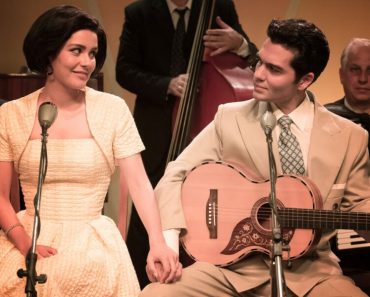By Ilias Karagiannis
New film, “I Exist” (Υπάρχω), which is approaching record-breaking performances of one million viewers, bridges generations through the history and music of Stelios Kazantzidis.
A dive into the soul of the nation, a hymn to nostalgia and lost eras. Director Yorgos Tsemberopoulos, with a surgical precision of emotions… resurrects the figure of Kazantzidis, not as a simple artist, but as a legend that unites generations.
In theatres, the audience sings softly, gazes are fixed, the shadows of memory take shape. It is as if the film opens a window into our collective unconscious, where heroes never die, but continue to exist as part of ourselves. Such scenes will soon be available in theatres in Australia, where the film will be screened.
The film’s screenwriter is Katerina Bei, a creative force who has redefined modern storytelling in Greek cinema, working on films such as “Happiness” and “The Murderer.” The biography of Kazantzidis is no exception. It is another link in her unbroken chain of successes.
The Greek Herald recently spoke with Katerina, trying to decode the unstoppable phenomenon of the success of “I Exist.”

She talks to us about the process of creating a work that carries the weight of memory, the challenges of portraying such a complex personality, up to the choice of Christos Mastoras for the leading role.
The success of the film “I Exist” has already exceeded all expectations. What is it, in your opinion, that makes the story of Stelios Kazantzidis so timeless and at the same time so fascinating for today’s audience and a generation of young people who may not have even heard his songs until they saw the film?
Kazantzidis had managed to become a symbol of an era, in a way that did not betray his origins. Despite his enormous success, the world felt like one of them. He was a star and an anti-star at the same time. He had integrity and his own code of honour that he followed unwaveringly, and this made him a hero in the eyes of the world. He also lived simply, isolated and despised money. All of this, combined with the enormous charisma he had in his voice, gave him mythical dimensions.
However, I believe that beyond Kazantzidis’ fans, who are many and love him with fanatical fandom, a large part of the film’s appeal to young people is also due to the fact that he is played by Christos Mastoras. We knew that young people loved him, but we could never imagine this response.
I think that half the audience goes to see and hear Kazantzidis and the other half Mastoras. What matters, however, is that everyone comes out singing Kazantzidis…
What were the biggest challenges in trying to approach the life of a legend like Stelios Kazantzidis? Were there any moments during the writing process when you felt the burden of responsibility to capture his explosive personality as closely as possible to reality?
His personality was extremely contradictory, unusual and therefore very interesting. Persistent, stubborn, fair, complaining, impulsive, self-destructive, sensitive and at the same time cruel, suspicious, frugal but also assertive. He was a man who, while he was adored like few others, did not seem to be able to rejoice. As if his demons were hating his joy.

I was lucky enough to talk with his family and with Giorgos Lianis and Kostas Balachoutis who, in addition to being his biographers, knew him well. This helped me to decipher him somewhat and to understand how his character was slowly formed. The death of his father, from a beating by Hites, and his relationship with his mother were among the experiences that defined him.
Regarding the burden of responsibility, I will say that when I make the decision to deal with a subject – much more so when it concerns a biography – I try to do my best – to read, to analyse, to cross-reference – knowing very well that the result will not satisfy everyone. But when you do this work, you cannot enter into the process of constantly self-censoring. You must simply do your job as seriously and “bravely” as you can, without thinking about others.
The protagonist of the film, Christos Mastoras, gives an excellent performance. What were the criteria for his selection, and how did you collaborate to capture Kazantzidis’ personality with authenticity?
Christos, like many actors, went through the casting. When we saw the final videos, both the director Yorgos Tsemberopoulos, the producer Dionysis Samiotis, and the entire creative team unanimously agreed in favour of Christos. It was a risk in any case, since, no matter how good and resourceful he was, we could not know if someone who was not a professional actor could bear the burden of daily, demanding filming.
But Christos is a very conscientious, intelligent and serious person, who surprised us with his dedication, professionalism, hard work and talent.

He took acting lessons and rehearsed with the director and the actors. But apart from his consistency and enthusiasm, I must say that he is also a very, very good person, modest – with a great sense of responsibility – which made us all love him.
Yorgos Tsemberopoulos directed the film with a vision that uniquely reconstructs the era of Stelios Kazantzidis. How was your collaboration with him, and how did this creative partnership shape your own work on the screenplay?
Yorgos and I have known each other for many years and are friends, although we had never had the chance to work together. Yorgos is very detail-oriented and persistent and entered the project – as if he had been ready for a long time – with drive and enthusiasm, at the stage when the script already existed. From that moment on, we coordinated, immediately, quickly and easily, we collaborated very well together, we discussed and analysed everything and I think we ended up with a perspective that describes exactly what we all wanted for the film.

With successes such as “Happiness,” “The Murderer,” “I Exist” and many more, do you believe that you have discovered the secret to success in Greek cinema? Is there any element that you consider essential for a film to touch the heart of the audience?
Films are team work and certainly for something to go well, it means that many factors have collaborated. I simply do my job – a job that I love very much – but I think that the general conditions play a bigger role. I have made all three of these films with the same production company, Tanweer.
I think that is where the secret lies. Apart from the fact that after so long, I can say that our perspectives are in line, I will say that the way they choose, set up and support their productions plays a big role. They start with the idea – the script – then the director enters into something already formed and then the production is set up, on a predetermined identity. The producer’s cinema, that is. At the same time, there is also a plan for how the film will be communicated. I want to say that things do not happen by chance, which is why they have a better chance of going well.

Let me go back to “I Exist” and ask what was the most difficult part of writing the script? Is there a specific scene or aspect of Kazantzidis’ life that was particularly difficult for you to capture?
Biographies are the most difficult genre because, among other things, you have to contend with the beliefs that exist about the person you are called upon to describe. This becomes even more difficult when your hero is contradictory and has fanatical friends and opponents. There you have to make brave decisions and stay firm in what you want to say. There are many ways to tell a story. To isolate a phase of his life, to focus on his personal or professional life, to develop a long period of time, to focus on a decisive event, etc.
We decided to deal with the first period of his life, up to the moment when he decided to say “I Exist” and not sing again. We wanted to show the elements and circumstances that made him reach the top and the reasons he decided to remain silent. This made us focus on his psychology and character and our intention was that after watching the film, the viewer would understand him and sympathise with him.

Stelios Kazantzidis was the voice of the foreign world, accompanying with his songs the nostalgia and pain of immigrants, such as the Greeks of Australia, loyal readers of The Greek Herald. They are even eager to watch the film. How is this deep connection with immigration captured in the film and what message do you think it conveys to the Greeks of the diaspora who grew up with his music?
It is a given that a basic “ingredient” of Kazantzidis’ “core” is the pain of refugeehood, immigration, and foreign life. There is a strong Pontic element in the film, a Pontic dirge and a Pontic wedding song are heard. His mother speaks in a similar idiom. The hero himself is constantly conscious of “belonging”, of who he is, to whom he is addressed, what is the world he represents. We have scenes from a tour, where immigrants adore him and we hear “Passport,” the quintessential song of foreignness.
In closing, a personal question. The success of “I Exist” confirms your ability to tell unique stories. What are your future plans?
It is impressive how interesting all lives are, if you look at them closely. All people have something fascinating to tell and this – fortunately for those of us who write – is inexhaustible. We are discussing with my producer, to make a very special and unique biography in the coming years. But we have other plans ahead of us. We want to experiment in other genres as well… Let’s see…






